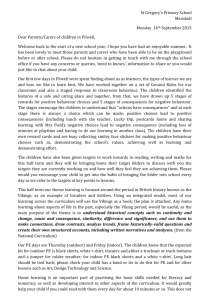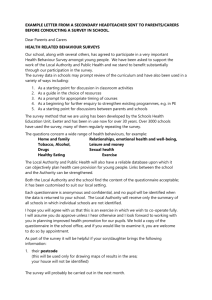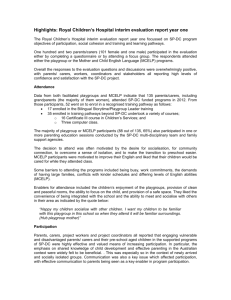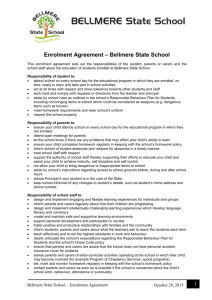WHOS WHO 2013 - Hawthorn Project
advertisement
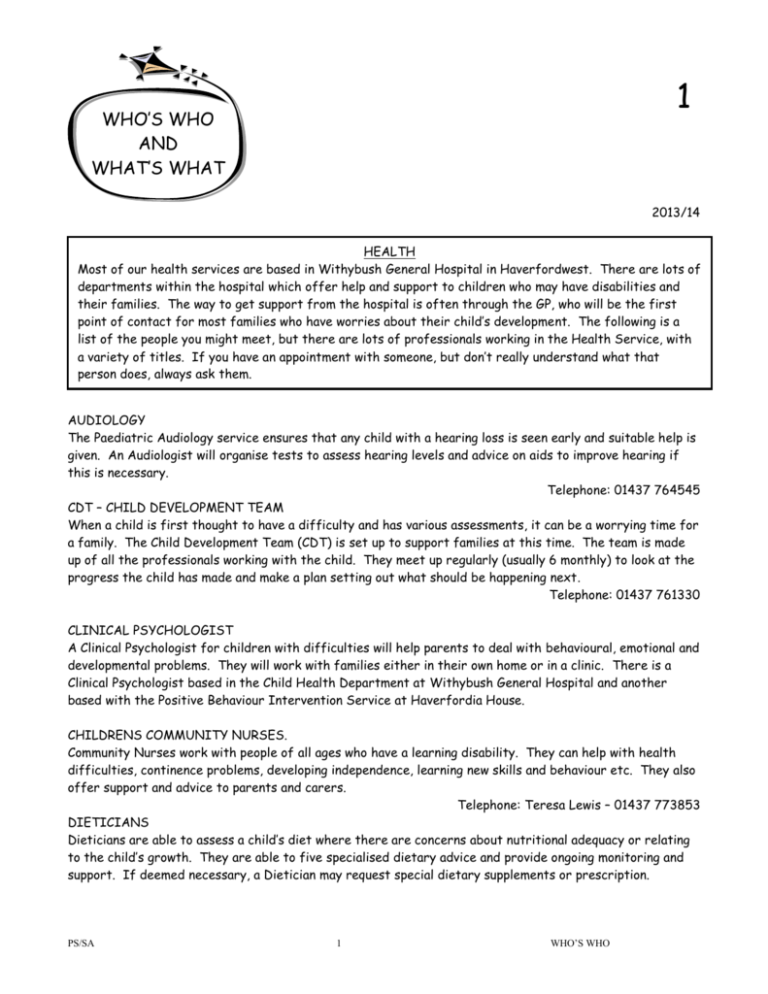
1 WHO’S WHO AND WHAT’S WHAT 2013/14 HEALTH Most of our health services are based in Withybush General Hospital in Haverfordwest. There are lots of departments within the hospital which offer help and support to children who may have disabilities and their families. The way to get support from the hospital is often through the GP, who will be the first point of contact for most families who have worries about their child’s development. The following is a list of the people you might meet, but there are lots of professionals working in the Health Service, with a variety of titles. If you have an appointment with someone, but don’t really understand what that person does, always ask them. AUDIOLOGY The Paediatric Audiology service ensures that any child with a hearing loss is seen early and suitable help is given. An Audiologist will organise tests to assess hearing levels and advice on aids to improve hearing if this is necessary. Telephone: 01437 764545 CDT – CHILD DEVELOPMENT TEAM When a child is first thought to have a difficulty and has various assessments, it can be a worrying time for a family. The Child Development Team (CDT) is set up to support families at this time. The team is made up of all the professionals working with the child. They meet up regularly (usually 6 monthly) to look at the progress the child has made and make a plan setting out what should be happening next. Telephone: 01437 761330 CLINICAL PSYCHOLOGIST A Clinical Psychologist for children with difficulties will help parents to deal with behavioural, emotional and developmental problems. They will work with families either in their own home or in a clinic. There is a Clinical Psychologist based in the Child Health Department at Withybush General Hospital and another based with the Positive Behaviour Intervention Service at Haverfordia House. CHILDRENS COMMUNITY NURSES. Community Nurses work with people of all ages who have a learning disability. They can help with health difficulties, continence problems, developing independence, learning new skills and behaviour etc. They also offer support and advice to parents and carers. Telephone: Teresa Lewis – 01437 773853 DIETICIANS Dieticians are able to assess a child’s diet where there are concerns about nutritional adequacy or relating to the child’s growth. They are able to five specialised dietary advice and provide ongoing monitoring and support. If deemed necessary, a Dietician may request special dietary supplements or prescription. PS/SA 1 WHO’S WHO FAMILY DOCTOR (GP) Your family doctor will usually be your starting point for any concern about your child’s health or development. Your GP acts as a gateway to other professionals and can refer you to specialist services for tests, diagnosis or treatment. HEALTH VISITOR Health Visitors are trained nurses with specialist qualification who can give advice on child care and development. They have special responsibility for all children under 5 and will give new parents a red book to record a child’s personal health record. They may see you in your home or at a clinic. PBIS – POSITIVE BEHAVIOUR INTERVENTION SERVICE The Positive Behaviour Intervention Service is a group of health workers who offer advice and support – mainly about managing behaviour – to people with learning disabilities and their families. They will assess children and young people who have behaviour which is proving difficult and will develop a plan to help families to manage the behaviour. They will work with a family until they feel they are confident about dealing with the behaviour. Telephone: 01437 776404 OCCUPATIONAL THERAPY FOR CHILDREN The Paediatric OT service is based at Withybush General Hospital and aims to help children access play and learning experiences and increase their independence. Children from 0-19 are seen either in clinic at the hospital or in the community – at home, school or playgroup. The OT would assess a child’s needs and offer individual treatments and advice. Advice about specialised equipment and seating can also be given. Telephone: Aveline Woolf – 01437 773052 OPHTHALMOLOGY SERVICES If a child is thought to have any problems with their vision they may be referred to a Consultant Ophthalmologist at the hospital. The child may be seen by an Orthoptist who assesses for visual problems and squints. Telephone: 01437 764545 PAEDIATRICIAN (COMMUNITY) Community Paediatricians are doctors who specialise in assessment, diagnosis and treatment of children and young people. They work with lots of other professionals such as Occupational Therapists, Physiotherapists and Speech Therapists. The Consultant Community Paediatrician leads a team of doctors called Clinical Medical Officers. The Community Paediatrician sees children with a range of special needs. Telephone: Dr M Simmonds – 01437 773848 CLINICAL MEDICAL OFFICERS (CMO) Clinical Medical Officers are doctors working within the Child Health Department at the hospital. They usually see children in their own home community and are linked with local schools. They offer lots of services including: Health Screening Assessment of children with developmental difficulties or delay Assessment for possible educational needs Hearing and vision checks Child Protection work The Clinical Medical Officers work as a team along with Health Visitors, School Nurses and others to provide a comprehensive health care service for children within local areas. Telephone: 01437 764545 PS/SA 2 WHO’S WHO PAEDIATRICIAN (HOSPITAL) Hospital Consultant Paediatricians play a major role in the diagnosis and treatment of children with acute illnesses as well as disability and chronic illness. Hospital Consultants see children in the hospital ward and also in hospital out-patient departments. They may hold joint out-patient clinics locally with visiting Consultant Specialists from another hospital. Telephone: 01437 764545 PHYSIOTHERAPY SERVICES Physiotherapists (Physios) use exercise and other physical treatments to improve movement, strength and co-ordination and to help the body to develop and work properly. They can show parents and carers, teachers and assistants how to handle a child to help him/her cope better with the needs of daily life and to reach their greatest possible level of mobility. Treatment may be given at home, the clinic or in school. Telephone: 01437 773261 SCHOOL NURSES School Nurses are nurses who have specialist skills in dealing with the health needs of children. They have overall responsibility for the health screening of all children in school and they are available to met parents to deal with any aspect of their child’s health they may be concerned about. School Nurses also work closely with teachers on health education programmes in school as well as on a one-to-one basis with a child and family. Each school in Pembrokeshire has their own School Nurse and School Doctor. The school nurse will take over from the Health Visitor when a child begins school. Telephone: 01437 773850 SPEECH AND LANGUAGE THERAPY The Speech and Language Therapist is concerned with assessing, diagnosing and helping children with a wide range and variety of communication difficulties. They also help with feeding and swallowing problems in children. Communication covers a wide range of things including speaking, listening, reading and writing. Therapists provide support and advice to both children and their carers. They work closely with teachers and health professionals, including doctors and psychologists. Children are seen at home, in the clinic or in school. Telephone: Lynne Roberts 01437 773393 or 773267 EDUCATION If a child has a disability or additional needs, they may be receiving some help from the Health Department before they start school – possibly speech and language therapy, physiotherapy or maybe extra help at playgroup. The staff working with pre-school children will want to let the Education Department know about any additional needs a child might have. This is to make sure that the children have the help they require when they start school. The department responsible for schools is the Education Department and you can contact them at County Hall on 01437 764551. EDUCATIONAL PSYCHOLOGIST Educational Psychologists understand how children learn and develop. They are trained to work with children from birth to 19 who are having difficulty with learning or behaviour. They work with parents, teachers and other professionals to assess what difficulties a child may be having. Educational Psychologists are based in the Education Department at County Hall. Telephone: 01437 764551 PS/SA 3 WHO’S WHO ADDITIONAL LEARNING NEEDS COORDINATOR (ALNCO) All schools have a teacher who is responsible for co-ordinating the help received by the children in school who have special needs. This teacher is called the ALNCO. In smaller schools the ALNCO is often the Head Teacher or Deputy Head. In larger schools the ALNCO will be the Head of the Additional Needs Department. This is the person to speak to if you have concerns about how your child is doing in school. LEARNING SUPPORT ASSISTANTS (LSA) They work closely with teachers and ALNCO’S to help children with their education. They provide support to children under the direction of the teacher. SPECIAL NEEDS SUPPORT SERVICES Specialist teachers come into school to give advice and support to teacher, individual children and their parents. The work of the service includes: Support for children with emotional and behavioural difficulties. Support for children with sensory impairments Support and advice to pre-school children with disabilities and to their parents. Support teachers are based in the Education Department in County Hall. Telephone: 01437 764551 SPECIAL EDUCATIONAL NEEDS (SEN) A child with a learning difficulty finds it harder to learn than other children of the same age. It may also be that the child has some behavioural difficulties that make it difficult for them to concentrate on learning. Education Law says that if a child has a learning difficulty then they should have extra help at school. Most of the children who have a special need stay at their mainstream school and the extra help is given to them there. Some children who have very particular difficulties may go to a specialist school so that these needs can be focussed on. SOCIAL CARE AND HOUSING If you need help in meeting your child’s needs at home, then a referral has to be made to the Social Care and Housing Department in County Hall. This referral can come from you, or from one of the professionals working with you and your family. The following are the workers or teams you may meet once a referral has been made. SOCIAL WORKERS Social Workers offer advice, information and emotional support. They assess the needs of children and young people and their families and then organise and co-ordinate the services they need. There is a team of social workers who work with children with disabilities. At times the social work teams also work with children who have suffered harm, or may be at risk of harm. Telephone: 01437 764551 PS/SA 4 WHO’S WHO VOLUNTARY SECTOR Social Care and Housing or Education may give money to voluntary or charitable groups to provide some services for families. Here are some of those offering services or advice in Pembrokeshire. BARNARDO’S Barnardo’s Pembrokeshire Family link provides a range of services to disabled children and young people and their Families living in Pembrokeshire. Domiciliary care /activity services Support workers enable the child/young people to access play and leisure activities in the communities. We also offer a sitting service in the Childs own home /with siblings if appropriate. Short break care – We have team of experienced short break carers who provide overnight short breaks in their homes, these carers are recruited, trained and assessed as foster carers, children and young people may stay one night a fortnight or more depending on their assessed need. Both these services are registered with the CSSIW and inspected annually by them. Both services are referred to by the Children with Disabilities team or Action for Children key workers and children and young people will have had an assessment of need. Telephone: 01646 687064 REFERRAL SCHEME If you would like your child to attend his/her local playgroup but feel that he/she will not cope there without extra support, the referral scheme may be able to help organise a Helping Hand to help your child join in the activities of the playgroup. Telephone: Claire Cox – 01437 775700 SPECIAL NEEDS ASSESSMENT PLAYGROUP (SNAP HAVERFORDWEST) This is a playgroup held at the Child Health Department at Withybush General Hospital for children with a disability of developmental delay. Through the play opportunities SNAP provides, they assess a child’s developmental needs and plan their future needs in readiness for them starting school or local playgroups. There is also a small SNAP playgroup in Pembroke Dock. Telephone: 01437 773860 SPECIAL NEEDS ADVISORY PROJECT (SNAP CYMRU) The SNAP project gives information, advice and support to parents to help them make sure their children are having the support they need within schools or nurseries. They can offer help to parents during the assessment of their child’s educational needs with writing or understanding reports, writing letters and attending meetings. They are also helpful for directing parents towards other support e.g. other voluntary groups, explaining options, helping them to understand the jargon used by professionals and helping them to understand the processes of help and support for them and their children. Telephone: 01437 768097 FAMILY INFORMATION SERVICE This is an information service which covers the whole of Pembrokeshire and can offer accurate, impartial and up-to-date information on many aspects of child care. For example, they have details of childminders and crèche facilities as well as information about playgroups and holiday play schemes. Telephone: 01437 775700 PS/SA 5 WHO’S WHO



